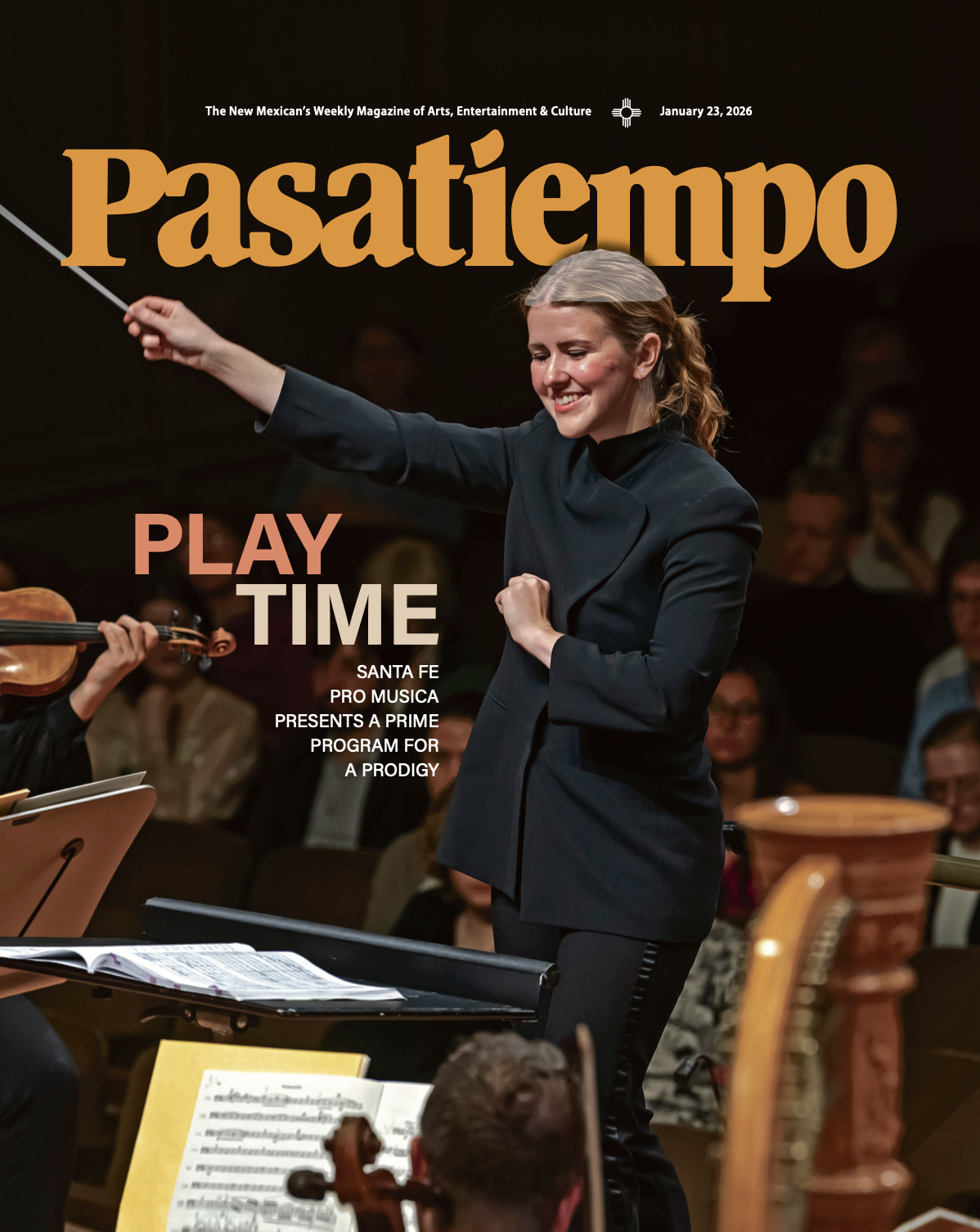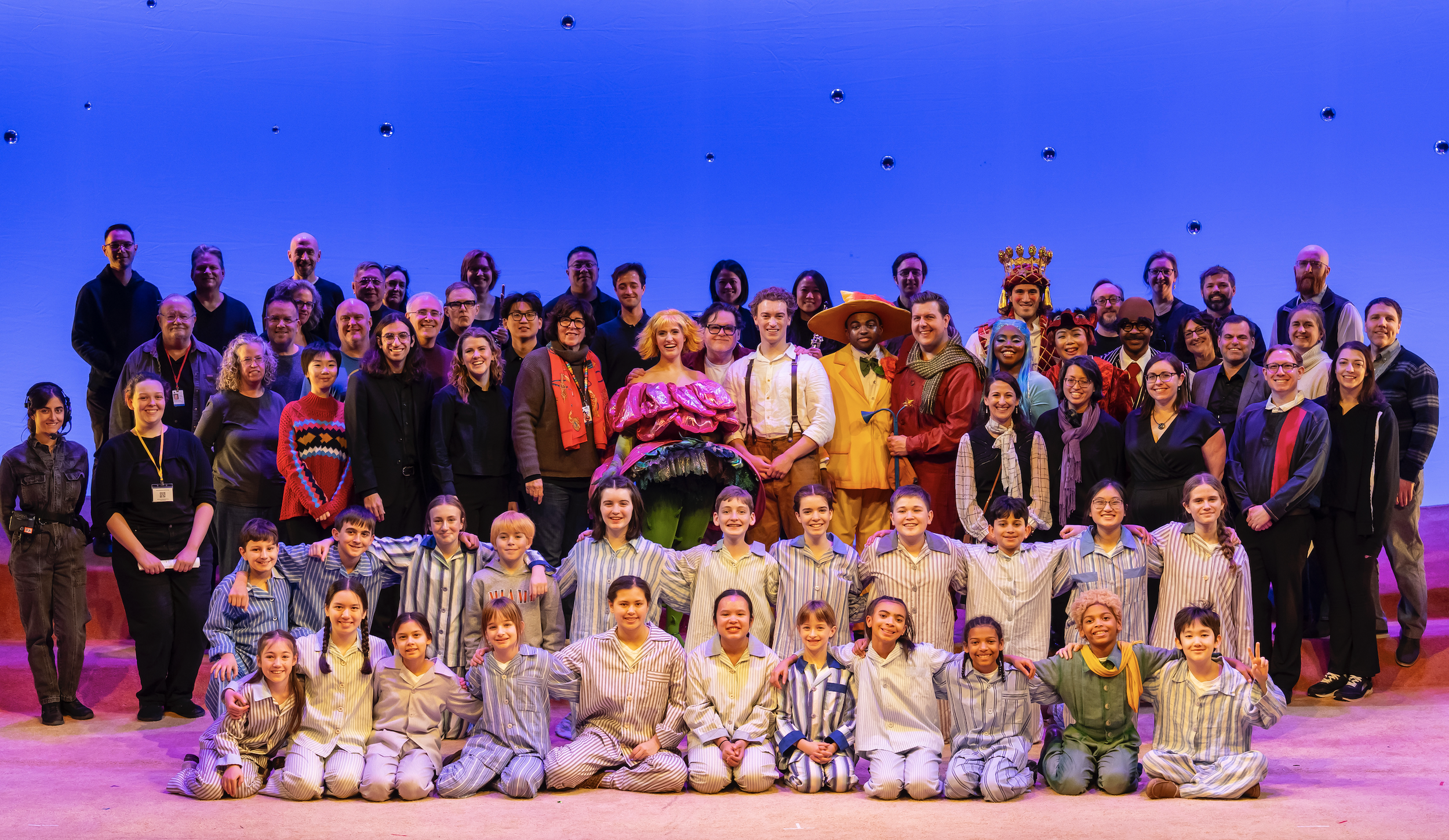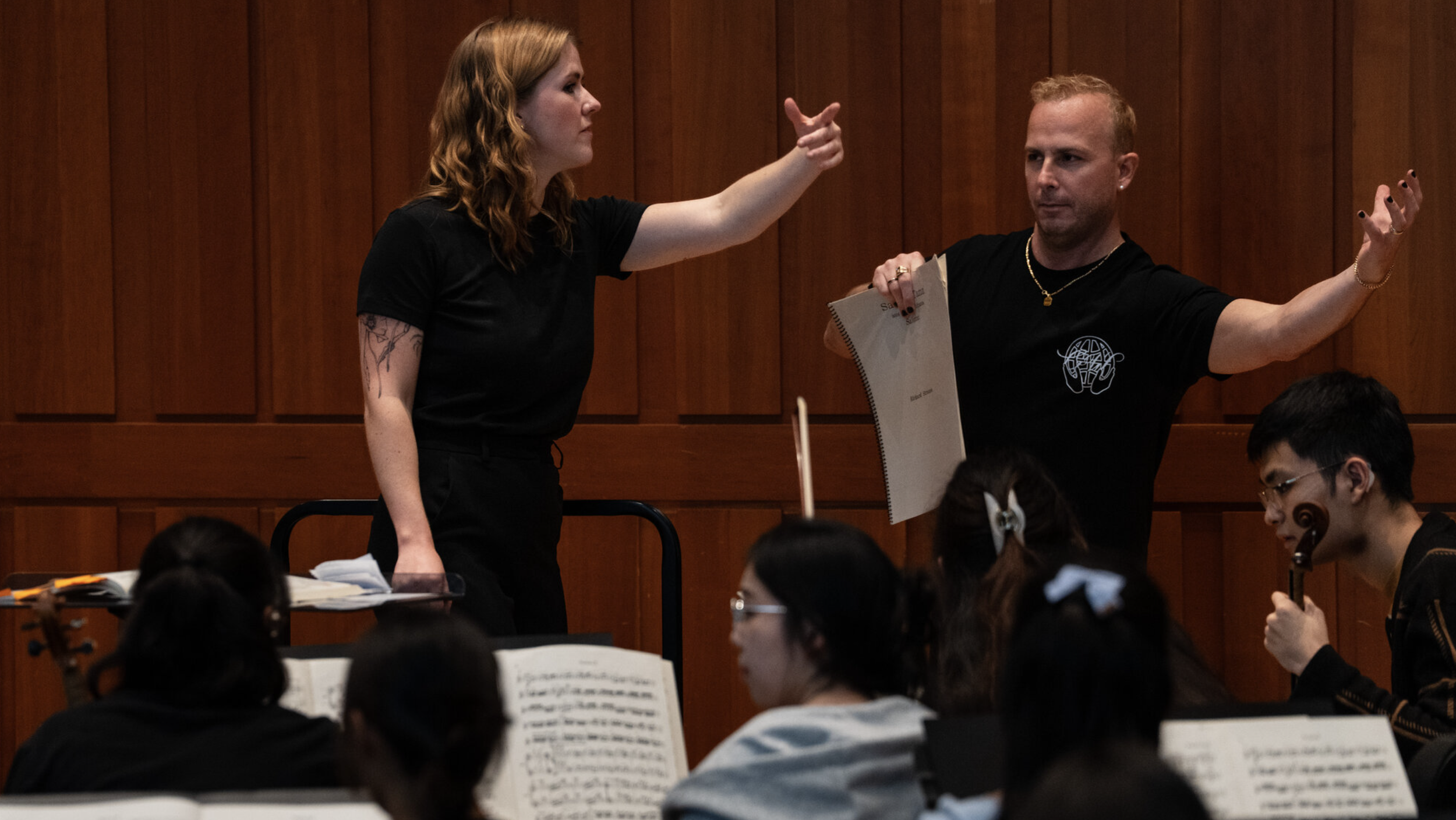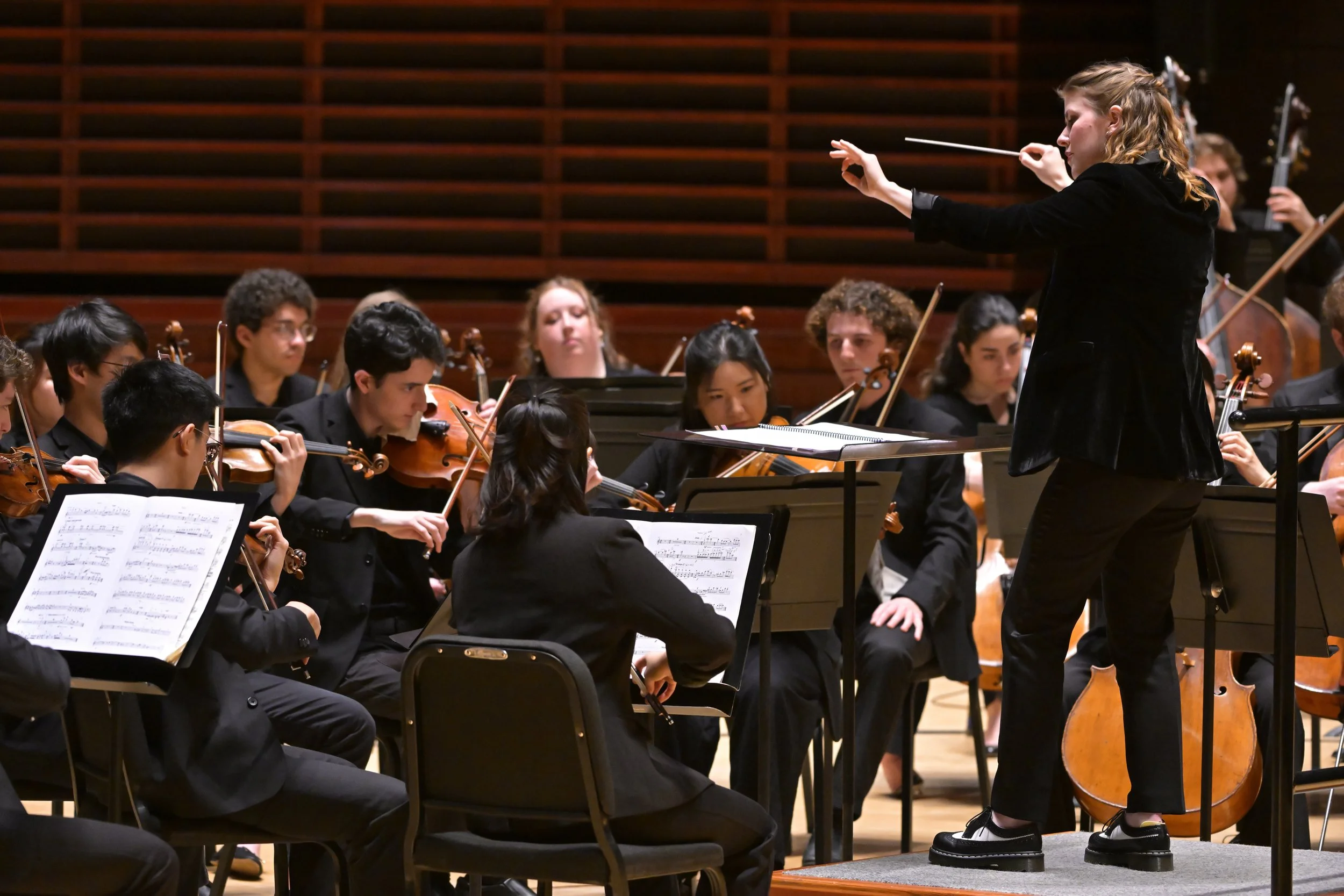Features
Review: Micah Conducts Dance of the Seven Veils from Salome
“If anyone could convert me to the church of Strauss, it’s the excellent Curtis orchestra fronted by conducting fellow Micah Gleason. In Gleason’s hands, the dance sounds slightly drunk—an appropriate mode for this uncharacteristically slinky piece from Strauss. Gleason honors the fluidity of the score, keeping the rhythm loose and seductive. It’s for this reason that the frenzied finale absolutely punches us in the face. Gleason up to this point has been teasing, stirring the orchestra with a subtle, gentle hand. When the finale arrives, Gleason digs in, and her joy and exuberance come through both in the music and in her physical performance. It’s no wonder her mentor is the famously joyful and exuberant Yannick Nézet-Séguin.”
Read the full review here.
Mozart's Birthday Concert is a Celebration of Youth
Micah’s concert with Santa Fe Pro Musica is highlighted in Pasatiempo magazine. Read more here.
Micah is interviewed on SCORE KEEPERS podcast
Daniel Farrell interviews Micah on his podcast SCORE KEEPERS: Explore the realm of modern music with Daniel Farrell and guests as they dive into the heart of artistic expression, sharing candid conversations and insights that unravel the threads of creativity.
Micah is interviewed on What is Opera, Anyway? podcast
Malinda Wagstaff interviews Micah on What is Opera, Anyway? podcast.
Review: Micah sings and conducts Berio’s Folk Songs
Full review here.
"Our headliner is a set of eleven folk songs by Luciano Berio, the only composer on the program no longer among the living. Scored for seven instruments and one voice, the undeniable highlight of Folk Songs is Micah Gleason, who conducts—or, more accurately, reinterprets the entire art of conducting—while also singing the mezzo-soprano vocal.
It’s easy sometimes to forget that a musical performance requires both music and performance. Much of what we see in classical performance is impressive in the former but painfully austere when it comes to the latter. To play instruments, even to play them extremely well, is not the same as to perform.
This is where Gleason’s talent, already evident in her conducting work with the Curtis Symphony Orchestra, really shines. Gleason recognizes that conducting is a performance art, and she uses it not just to keep time or to manage dynamics but to tell a story, to respond to the music as she’s guiding it along. She’s playing with the musicians instead of merely playing them. Her gestures are dancey, emotive. The ensemble becomes more like a rock band, taking cues not just off the lead singer but off each other as well.
There are points in Berio’s song cycle where the music demands to be more fluid, less “conducted.” Sometimes Gleason gives her fellow players just enough to get started, or takes hold of one song while letting the band run the show for the next. By conducting as part of the ensemble rather than as a separate figure, Gleason reminds us that the conductor’s art is, at its best, a collaborative rather than an instructive one. It need not be staid and predictable, but it also doesn’t have to hog center stage.
Gleason’s final triumph is to shatter the illusion of distance between the conductor and the audience. During the joyful closing number, “Azerbaijan Love Song,” Gleason starts clapping. As she claps along to the beat, the realization grows steadily upon the audience that, holy shit, she wants us to clap along with her.
Is this allowed? Pockets of the audience join in with tentative hands, shocked that they are being asked to acknowledge their own existence. This shock is soon thrown into shadow by a new one: Gleason descends from the stage(!) and skips around the auditorium(!!), clapping and singing all the while. A few more folks start to clap along, but many remain frozen, incapable of registering this turn of events. This was not indicated on the program.
This level of interactivity is alien and discomfiting to an audience accustomed to the hushed solemnity of the concert hall. And thank goodness for it, and for Gleason, doing her part to peel away the veneer of gentility that rightly turns so many would-be fans away from classical music."
Review: Micah conducts The Little Prince at Washington National Opera
“Visually and musically, a seasoned creative team guided the opera. Conductor Micah Gleason led the orchestra with clarity and sensitivity, allowing Composer Rachel Portman’s score to bounce between whimsical charm and still reflection.”
Read full review here.
Review: Micah conducts The Little Prince at Washington National Opera
“Maestra Micah Gleason conducted a superb sounding 14 piece orchestra which played Portman’s score to audible perfection.”
Read full review here.
Micah is selected as one of four Taki Alsop Conducting Fellowship award winners.
The Taki Fellowship is currently a two-year award that primarily includes intensive coaching and mentoring with Marin Alsop and other music industry professionals. Read more here.
New York Times Curtis Institute feature
Micah, “an easygoing yet fiercely skilled conductor and singer” profiled by the New York Times in a recent photo essay about the lives of five Curtis students.
Read/see more here.
Q&A with conductor Micah Gleason - Part II
In an interview with Ryan Lathan, Micah discusses singing and conducting, special projects, and confronting gender imbalance in the conducting world head-on. Read more here.
Dallas Opera Announces 2023-24 Hart Institute for Women Conductors Cohort
Micah is chosen as one of four conductors selected for the Dallas Opera’s 2023-24 Hart Institute Cohort. TDO’s Hart Institute, launched in 2015, is the only program of its kind in the world and seeks to address the extreme gender imbalance of leadership on the podium as well as in administration in opera companies. Now in its seventh year, more than 500 women conductors from 40 nations have applied to be trained, advised, and supported by this extraordinary initiative.
Read more here.
Q&A with conductor Micah Gleason - Part I
In an interview with Ryan Lathan, Micah discusses Igor Stravinsky's "L'Histoire du Soldat" and Nick DiBerardino's Star Trek-inspired work "Darmok & Jalad." Read more here.
The Glimmerglass Festival announces 2023 Young Artists
Micah Gleason serves as assistant conductor for two opera productions at The Glimmerglass Festival: Rinaldo and Candide. Read more here.
Review: Micah Conducts La Passion de Simone with Mannes Opera
“Micah Gleason led with clarity and rhythmical distinction an orchestra of 28 players, larger than the the prescribed 19; all sections responded alertly. Musically, this was the most impressive Mannes show I’ve heard.”
Full review can be found in January 2026 issue of Opera News.
Review: Micah Conducts La Passion de Simone with Mannes Opera
“Micah Gleason conducted the Mannes Orchestra, shaping Saariaho’s sound world with precision and imagination. Her pacing revealed the “Palestrina bass line” Saariaho so admired — not just an underpinning, but an independent melodic thread, constantly conversing with the voices above. The higher textures — chimes, bells, whispering strings — lifted the music into another realm.”
Read full review here.
Micah is chosen as the winner of the 2025 American Prize in Conducting
Read more here.
Micah joins Intermusica artist roster
Micah joins Intermusica for mentorship and worldwide management. Read more here.
American Prize in Conducting National Winners Announcement
Micah is awarded second place in The American Prize in Conducting (orchestras), 2022 —college /university division.
Read more here.
Review: Micah Conducts Julia Perry’s Short Piece for Orchestra
Micah’s performance of Julia Perry’s Short Piece for Orchestra is reviewed by music critic Michael Fisher with Phindie.
“…But it’s precisely those in-between pieces, that stuff between the page breaks, that really demands attention…Micah Gleason is savvy in this respect. Rather than race through the subtle, meandering passages between the syncopated strings, Gleason correctly identifies them as the soul of the piece. The third passage in particular reveals the sorrow and the longing at the heart of this music. A melancholy lyrical passage gets volleyed around the stage, floating atop a low drone held by the basses. It’s a contemplative passage, and thank goodness Gleason has the patience for it. Everything in this third act is controlled and sustained; instrumental voices speak freely and all they can talk about is their hunger and their fear. A lesser conductor would see this passage as a detour, a tangent, but Gleason knows that this is really what the piece is about: hunger, fear, and the impossibility of overcoming either.”
Read the full review here.
Meet Micah Gleason: Canvas Rebel
Read Micah’s interview on taking risks, learning, and unlearning with Canvas Rebel here.


















